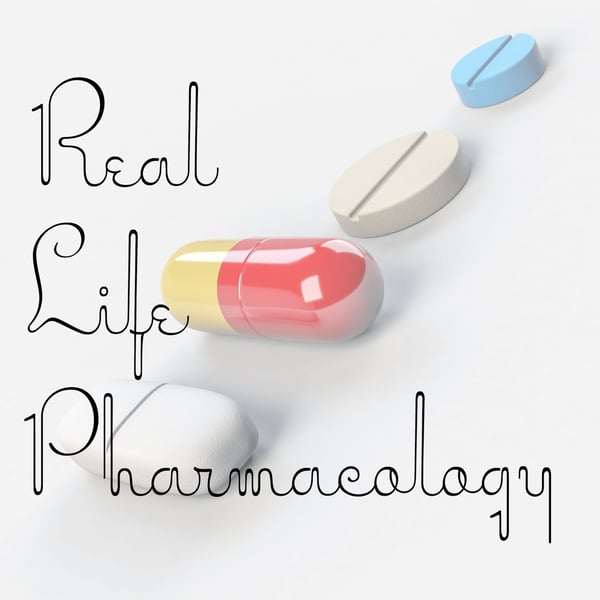Quinapril Pharmacology
Real Life Pharmacology - Pharmacology Education for Health Care Professionals
Eric Christianson, PharmD; Pharmacology Expert and Clinical Pharmacist
5 • 716 Ratings
🗓️ 12 June 2025
⏱️ 14 minutes
🧾️ Download transcript
Summary
Quinapril is a prodrug that is converted in the liver to its active metabolite, quinaprilat, which inhibits ACE, leading to decreased formation of angiotensin II and reduced aldosterone secretion.
Hyperkalemia can occur with quinapril use due to decreased aldosterone, leading to potassium retention—especially in patients with renal impairment.
Concomitant use of potassium-sparing diuretics or potassium supplements with quinapril increases the risk of hyperkalemia.
NSAIDs may reduce the antihypertensive effect of quinapril and increase the risk of nephrotoxicity, especially in patients with preexisting renal dysfunction.
Transcript
Click on a timestamp to play from that location
| 0:00.0 | Hey, all, welcome back to the Real Life Pharmacology podcast. I'm your host, pharmacist, Eric Christensen. |
| 0:05.0 | Thank you so much for listening today. As always, go check out Real Life Pharmacology.com. |
| 0:11.0 | Simply an email will get you access to our top 200 study guide. It's a 31-page PDF, |
| 0:17.0 | absolutely no cost to you. Lots of good reminders and things that also come up on board exams, |
| 0:23.6 | pharmacology exams throughout your career. |
| 0:25.7 | So definitely a no-brainer to go snag that. |
| 0:28.7 | We also get you updates as far as when we have new content and podcasts available as well. |
| 0:34.6 | So again, go check that out, Real Life Pharmacology.com. |
| 0:39.2 | All right. Let's get into the drug of the day today. That is Quintapril. Brand name of this |
| 0:45.2 | medication is Acupril. And as you could probably imagine by that ending, P-R-I-L, this is indicative of an ACE inhibitor. |
| 0:56.7 | So, ACE inhibitors spelled out angiotensin-converting enzyme inhibitor. |
| 1:02.9 | It's a class of anti-hypertensive agents, blood pressure-lowering agents. |
| 1:08.7 | And so that's primarily what it's going to be used for, commonly used in combination |
| 1:14.9 | with thiaside diuretics and calcium channel blockers, which are frequently used to manage blood pressure. |
| 1:23.3 | All right, dosing-wise in hypertension, we typically like to stick with once daily dosing. |
| 1:30.5 | Usually the kinetics allow us to do that. |
| 1:34.0 | Most patients are probably going to start in the 10 to 20 milligram range once daily. |
| 1:39.7 | You know, you might use 2.5 to 5 milligrams in patients with, you know, worse renal function, for example, but that can be a little bit dependent. |
| 1:48.5 | Geriatric patients, another good example of a situation where we might be a little bit more |
| 1:52.8 | conservative. I can titrate up to 80 milligrams per day in one or two dosages there. |
| 2:01.7 | Heart failure with reduced rejection fraction is the other primary indication that I wanted |
| 2:07.5 | to mention there. |
... |
Please login to see the full transcript.
Disclaimer: The podcast and artwork embedded on this page are from Eric Christianson, PharmD; Pharmacology Expert and Clinical Pharmacist, and are the property of its owner and not affiliated with or endorsed by Tapesearch.
Generated transcripts are the property of Eric Christianson, PharmD; Pharmacology Expert and Clinical Pharmacist and are distributed freely under the Fair Use doctrine. Transcripts generated by Tapesearch are not guaranteed to be accurate.
Copyright © Tapesearch 2025.

